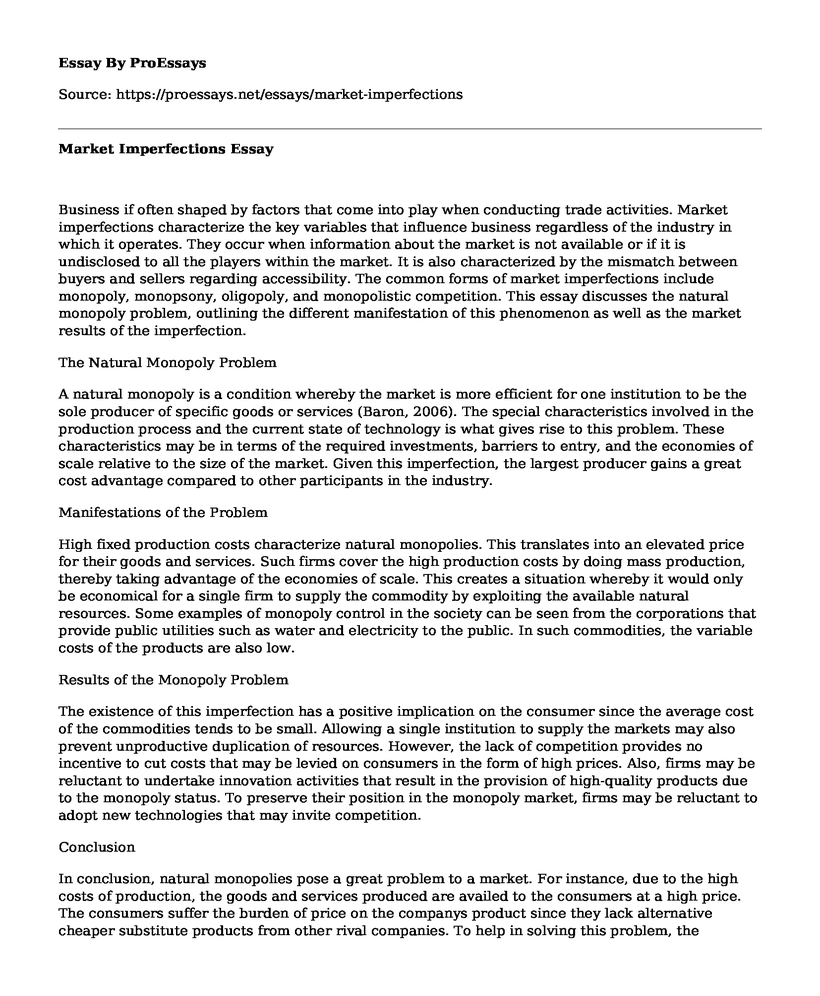Business if often shaped by factors that come into play when conducting trade activities. Market imperfections characterize the key variables that influence business regardless of the industry in which it operates. They occur when information about the market is not available or if it is undisclosed to all the players within the market. It is also characterized by the mismatch between buyers and sellers regarding accessibility. The common forms of market imperfections include monopoly, monopsony, oligopoly, and monopolistic competition. This essay discusses the natural monopoly problem, outlining the different manifestation of this phenomenon as well as the market results of the imperfection.
The Natural Monopoly Problem
A natural monopoly is a condition whereby the market is more efficient for one institution to be the sole producer of specific goods or services (Baron, 2006). The special characteristics involved in the production process and the current state of technology is what gives rise to this problem. These characteristics may be in terms of the required investments, barriers to entry, and the economies of scale relative to the size of the market. Given this imperfection, the largest producer gains a great cost advantage compared to other participants in the industry.
Manifestations of the Problem
High fixed production costs characterize natural monopolies. This translates into an elevated price for their goods and services. Such firms cover the high production costs by doing mass production, thereby taking advantage of the economies of scale. This creates a situation whereby it would only be economical for a single firm to supply the commodity by exploiting the available natural resources. Some examples of monopoly control in the society can be seen from the corporations that provide public utilities such as water and electricity to the public. In such commodities, the variable costs of the products are also low.
Results of the Monopoly Problem
The existence of this imperfection has a positive implication on the consumer since the average cost of the commodities tends to be small. Allowing a single institution to supply the markets may also prevent unproductive duplication of resources. However, the lack of competition provides no incentive to cut costs that may be levied on consumers in the form of high prices. Also, firms may be reluctant to undertake innovation activities that result in the provision of high-quality products due to the monopoly status. To preserve their position in the monopoly market, firms may be reluctant to adopt new technologies that may invite competition.
Conclusion
In conclusion, natural monopolies pose a great problem to a market. For instance, due to the high costs of production, the goods and services produced are availed to the consumers at a high price. The consumers suffer the burden of price on the companys product since they lack alternative cheaper substitute products from other rival companies. To help in solving this problem, the government formulates market policies meant to regulate the activities of monopoly corporations in their output levels and pricing.
References
Baron, D. (2006). Business and its environment. Upper Saddle River, N.J.: Pearson Education.
Cite this page
Market Imperfections. (2021, Mar 01). Retrieved from https://proessays.net/essays/market-imperfections
If you are the original author of this essay and no longer wish to have it published on the ProEssays website, please click below to request its removal:
- What Can We Learn From Other Countries: Children and Families Paper Example
- Essay Sample on Explanation on How Big Data Works in Digital Supply Chain
- Mill's Sociological Imagination: Understanding Society & the Individual - Essay Sample
- Essay Sample on Post-WWII Consumer Revolution: US Societal Change
- UN-Initiated Sustainable Development Goals: A Vision for 2030 - Research Paper
- Vets Now's New Brand: Winning Customers' Hearts & Minds - Essay Sample
- Essay Example on Four Parenting Styles: Benefits and Outcomes







